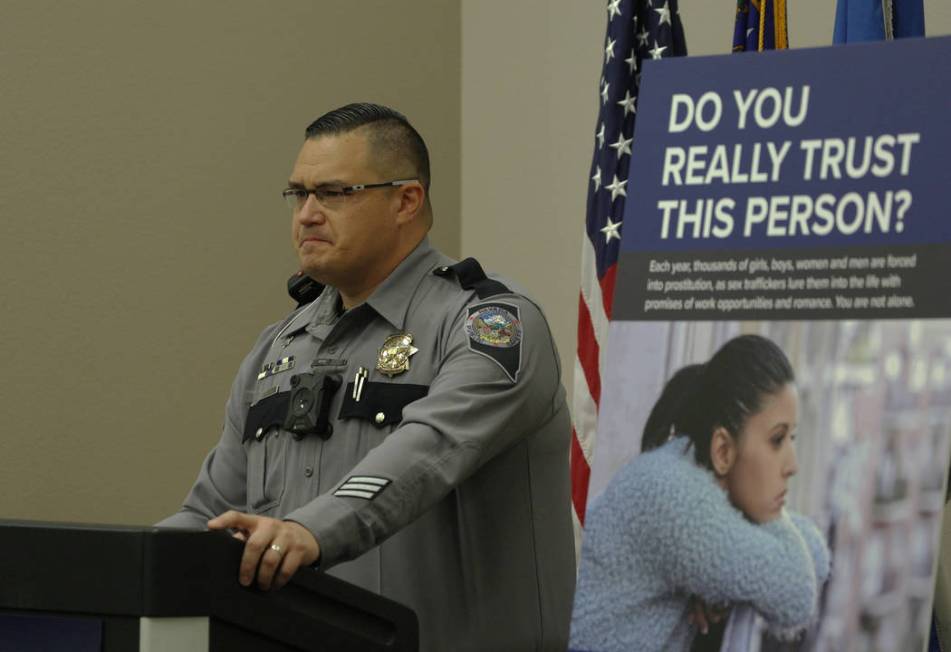Las Vegas Valley buses, stops to help fight human trafficking

A new media and poster campaign aims to raise awareness of sex trafficking in the Las Vegas Valley and remind its many victims that they are not alone.
Those coerced or forced into prostitution represent modern-day slaves, and the coordinated campaign effort encourages those victims to seek help when they are ready and able to do so, Nevada Highway Patrol trooper Brian Drohn said at a news conference Tuesday.
The victim-centered posters are displayed in English and Spanish at 50 bus stops throughout the valley and in nearly every bus in the Regional Transportation Commission’s fleet, said Drohn, who spearheaded the effort. The young and vulnerable are often targeted, but people of any age, gender or background can fall victim to the trafficking industry.
“I know that we can eliminate this crime from our community,” he said, speaking at the Highway Patrol’s Southern Command, 4615 W. Sunset Road. “We’ll save the lives of our friends, family members and neighbors — even ourselves — from this horrible reality.”
The Highway Patrol partnered with the commission; nonprofit Truckers Against Trafficking and its Busing on the Lookout subsidiary; and Vector Media Group to push awareness of the issue.
Traffickers often recruit at bus stops and use buses to move their victims, and victims themselves may visit bus stops as one of their first escape efforts, said Busing on the Lookout program director Annie Sovcik.
“In those precious moments when they’re so vulnerable to getting lured back, boarding a bus may actually be the only way they can get away,” she said.
Trafficking survivors helped design the posters to tailor the message to what would have resonated with them, she said. Each poster reminds victims they have support and help is available through the National Human Trafficking Hotline and the BeFree Textline.
Truckers Against Trafficking and the bus group work to help the transportation industry recognize the signs of trafficking, assist victims and alert law enforcement of buyers and sellers, Sovcik said.
TAT connected with the Highway Patrol in 2013, and troopers began training their staff on trafficking and how best to tackle the problem, Drohn said. Since 2017, he said, troopers have conducted seminars and educated the valley’s transportation industry and local carriers on their roles in the fight against trafficking.
Drohn said the media campaign will last indefinitely, and it complements existing efforts like the Las Vegas police-led Southern Nevada Human Trafficking Task Force and the recently formed Southern Nevada Sex Trafficking Multidisciplinary Team.
Drohn emphasized that law enforcement can’t prevent sex trafficking by itself. He instructed people to educate themselves on the issues and for buyers to stop paying for sex and seek help of their own.
He concluded with a message to victims.
“You’re not alone,” Drohn began. His lip quivered and his voice broke. “We’re here for you. Our hands are outstretched, and we want to help. This life does not need to be your reality — your nightmare — anymore.”
The audience applauded as Drohn walked toward his family awaiting at the door. He embraced his daughters, holding them close.
Contact Mike Shoro at mshoro@reviewjournal.com or 702-387-5290. Follow @mike_shoro on Twitter.